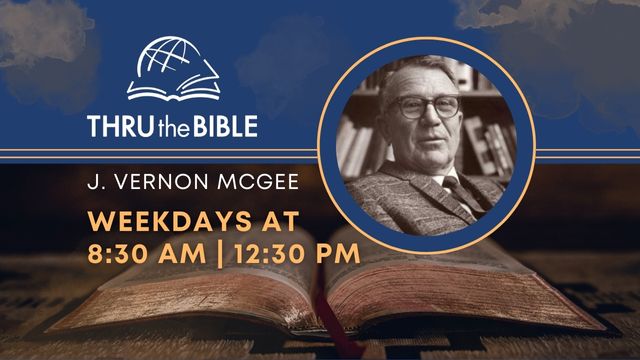Celebrating 50 Years of God’s Faithfulness
He had already been teaching on the radio for many years, but fifty years ago—1967, to be exact—Dr. McGee began teaching the Bible studies that laid the foundation for what we hear today on Thru the Bible. What an adventure it’s been! If he only knew, I’m sure Dr. McGee would laugh and shake his head in wonder at what God has done.
Let’s just think about it . . . in 1967, we never would have imagined . . . Read More
by Dr. J. Vernon McGee
The words of John 3:16—arguably the most well-known verse in the Bible—are simple. In fact, most of the words you read in the Gospel of John are so simple a child can read them, but they are also so profound that I wonder if any one of us really knows what they mean.
In the original language, John 3:16 reads, “loved God the world.” Greek sentence structure places the important part of the sentence first—the love of God.
Jesus communicated this simple, profound truth in a conversation with a man named Nicodemus. But often missed are two verses that come before John 3:16, and they help us to more fully understand. Let’s go back and read them:
And as Moses lifted up the serpent in the wilderness, even so must the Son of Man be lifted up, that whoever believes in Him should not perish but have everlasting life. -John 3:14, 15
Jesus calls Nicodemus’ attention to something he is very familiar with—an event in the Old Testament during Israel’s 40 years in the wilderness. (See Numbers 21:9). Jesus said that Moses lifted up the serpent, “Even so must the Son of Man be lifted up.” The “must” corresponds to the “must” our Lord said earlier to Nicodemus—“You must be born again.” Since Nicodemus must be born again, then the Son of Man must be lifted up. The necessity of being born again makes imperative the lifting up of Christ on the cross. It is a divine compulsion.
With this picture, our Lord threw open the doors of heaven for Nicodemus (and for us), and we see the King of Glory—not enthroned and crowned, but on a cross. Jesus Christ reveals His death on the cross to Nicodemus three years before He died. Clearly and definitively, this is why He came; He came to die.
Why? Why did He die? Because God loves you and me.
May I get personal? I am going to heaven someday. You may think, “Well, you must be very good.” On the contrary, I am not very good. I am going to heaven someday because of this one truth: Christ died for me, and I trust Him.
We have not adequately scaled the heights, plumbed the depths, or grasped the width of the love of God. Paul was accurate when he said, “To know the love of Christ which passes knowledge” (Ephesians 3:19). We are not able to measure the vastness or the intensity or the overwhelming goodness of God. If you could, it would break your heart, just as it would mine. I can only say that God loves you.
These are days in which a great many people are called to go through dark nights and deep waters. When you face problems and face them alone, you need to know that God loves you. Whoever you are, wherever you are, God loves you, and His love is revealed in Christ on the cross. And, my friend, you will find it only there. It is not on the mountaintops or on the surging sea; it is not in babbling brooks or majestic redwood trees—you will not find it anywhere in nature. The Bible makes this crystal clear. “God so loved the world that He gave redwood trees and babbling brooks”? No! “God so loved the world that He gave His only begotten Son, that whoever believes in Him should not perish but have everlasting life.”
Will you believe?

